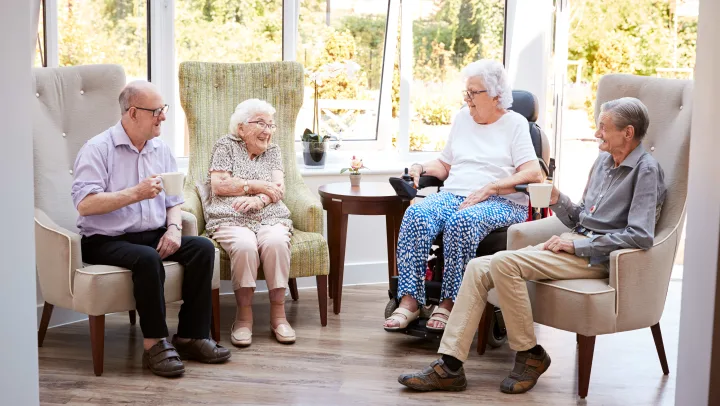Discover the top-rated Memory Care communities with experienced caregivers.
Discover the top-rated Memory Care communities with experienced caregivers.
Blog Article
The Role of Assisted Residing In Giving Specialized Care for Mental Deterioration Clients
The arrangement of specialized take care of dementia individuals within assisted living facilities is progressively identified as an important element of effective dementia administration. These settings are designed to deal with the one-of-a-kind cognitive and emotional difficulties faced by individuals with mental deterioration, offering tailored assistance that advertises safety and health. By incorporating structured routines and appealing tasks, assisted living can alleviate sensations of isolation while enhancing total lifestyle. The effectiveness of these programs commonly hinges on different elements, consisting of staff training and household participation, motivating a more detailed exam of exactly how these components engage to enhance care results.
Understanding Mental Deterioration Care Needs
Comprehending the care demands of individuals with dementia is crucial for giving efficient assistance and improving their top quality of life. Mental deterioration is a progressive neurological condition that affects cognitive functions such as memory, thinking, and communication. People with dementia usually need assistance with everyday activities, individualized treatment plans, and emotional support.
Reliable mental deterioration care includes recognizing the one-of-a-kind difficulties faced by each individual. This consists of understanding the phases of mental deterioration, which can range from light cognitive problems to innovative phases needing thorough help. Treatment needs might include support in taking care of day-to-day regimens, medication adherence, and keeping social interactions to protect against seclusion.
In addition, sensory stimulation and acquainted atmospheres can substantially boost the wellness of people with mental deterioration. Caretakers should be trained to identify behavior adjustments and use techniques tailored to each person's preferences and past experiences. Techniques such as validation treatment and memory can aid connect effectively and foster a complacency.
Eventually, efficiently addressing the care needs of individuals with dementia calls for a thoughtful approach, ongoing training for caregivers, and a commitment to preserving self-respect and respect throughout the caregiving procedure.
Benefits of Assisted Living

An additional significant benefit is the safe and safe setting these centers give. Citizens gain from functions such as safeguarded entrances and checked typical locations, reducing the danger of wandering and improving total safety and security. Assisted living advertises social interaction among residents, promoting a feeling of area and belonging. Engaging with peers can ease feelings of seclusion, which prevail in those dealing with mental deterioration.
On top of that, numerous assisted living facilities use support with everyday tasks, such as drug monitoring, showering, and dish prep work. This assistance enables citizens to keep their freedom while guaranteeing their health and wellness and wellness are focused on. Eventually, assisted living works as a useful resource, balancing care and autonomy for individuals with mental deterioration and their family members.

Specialized Programs and Tasks
(Assisted Living Charlotte)Identifying the one-of-a-kind demands of people with mental deterioration, several nursing home implement specialized programs and activities developed to improve cognitive function and promote general well-being. These programs commonly include cognitive stimulation activities that engage homeowners in memory video games, challenges, and reminiscence therapy, which encourages the sharing of individual tales and past experiences.
Furthermore, art and music treatment play considerable duties in cultivating imagination and psychological expression (Memory Care). Engaging citizens in painting, crafting, or songs sessions can supply therapeutic advantages, assisting to lower stress and anxiety and improve state of mind. Exercises, such as gentle workouts and dance sessions, are additionally vital, as they promote mobility and physical wellness while urging social interaction amongst citizens
Structured day-to-day routines are often developed to supply a feeling of stability and predictability for individuals with mental deterioration. These routines can consist of arranged meal times, team tasks, and personalized treatment strategies that satisfy individual passions and capabilities. By creating an improving environment loaded with customized activities, assisted living centers not just enhance the lifestyle for dementia clients yet also promote a feeling of community and belonging.
Trained Personnel and Assistance
(Memory Care Charlotte)In assisted living centers, the existence of trained team is vital for offering efficient assistance to individuals with dementia. These specialists possess specialized expertise and skills to address the special needs of citizens, ensuring their security, convenience, and well-being. Personnel get training in mental deterioration care, which consists of understanding the progression of the condition, recognizing behavioral adjustments, and employing efficient interaction techniques.
In addition, qualified personnel are equipped to execute tailored care plans customized to each local's choices and capacities. This individualized technique cultivates a sense of autonomy and self-respect, allowing locals to involve in meaningful activities that improve their lifestyle. The staff likewise play a crucial function in checking health and wellness, quickly determining any type of adjustments in problem that might call for clinical focus.
In addition to direct care, trained staff offer emotional support to locals, assisting to ease sensations of complication and stress and anxiety that commonly come with mental deterioration. Their thoughtful technique produces a nurturing atmosphere where locals feel valued and understood - Memory Care. Inevitably, the proficiency and dedication of qualified staff are indispensable in delivering thorough treatment that satisfies the complicated requirements of individuals living with dementia in assisted living setups
Household Involvement and Resources
Family involvement plays a significant duty in the treatment of people with dementia in nursing home. Involving household members in the care procedure not only enhances the psychological health of the homeowner yet additionally promotes a joint setting where treatment plans can be customized to private requirements. Families can offer useful understandings into the choices, history, and actions of their loved ones, which can educate caregivers and bring about more tailored care strategies.
Furthermore, aided living facilities often use resources for households, such as support system and instructional workshops. These sources can help households recognize dementia, improve communication approaches, and establish coping devices. Involvement in these programs can empower relative, furnishing them with the tools essential to support their loved ones effectively.
In addition, normal interaction between families and staff is crucial. This continuous dialogue allows households to remain informed regarding their enjoyed one's progression and any modifications in care strategies. Ultimately, a strong collaboration between family members and helped living facilities cultivates an environment of trust and understanding, ensuring that individuals with mental deterioration obtain the specialized care they are entitled to while keeping their household connections.
Verdict
Finally, helped living centers play an important role in dealing with the distinct demands of dementia individuals with customized care and assistance. By promoting risk-free settings, advertising social interaction, and executing structured routines, these centers enhance the overall wellness of locals. The involvement of qualified staff and households better enriches the treatment experience, ensuring that individual preferences and histories are respected. Ultimately, assisted living click to read gives important sources that substantially boost the lifestyle for those coping with mental deterioration.
Report this page